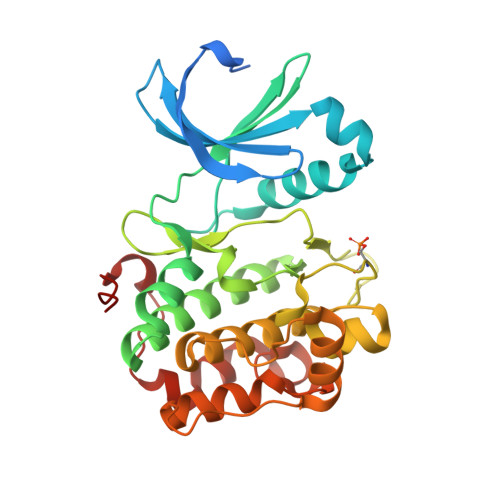An Allosteric Inhibitor Scaffold Targeting the PIF-Pocket of Atypical Protein Kinase C Isoforms.
Arencibia, J.M., Frohner, W., Krupa, M., Pastor-Flores, D., Merker, P., Oellerich, T., Neimanis, S., Schmithals, C., Koberle, V., Su, E., Zeuzem, S., Stark, H., Piiper, A., Odadzic, D., Schulze, J.O., Biondi, R.M.(2017) ACS Chem Biol 12: 564-573
- PubMed: 28045490
- DOI: https://doi.org/10.1021/acschembio.6b00827
- Primary Citation of Related Structures:
5MRD - PubMed Abstract:
There is a current and pressing need for improved cancer therapies. The use of small molecule kinase inhibitors and their application in combinatorial regimens represent an approach to personalized targeted cancer therapy. A number of AGC kinases, including atypical Protein Kinase C enzymes (PKCs), are validated drug targets for cancer treatment. Most drug development programs for protein kinases focus on the development of drugs that bind at the ATP-binding site. Alternatively, allosteric drugs have great potential for the development of future innovative drugs. However, the rational development of allosteric drugs poses important challenges because the compounds not only must bind to a given site but also must stabilize forms of the protein with a desired effect at a distant site. Here we describe the development of a new class of compounds targeting a regulatory site (PIF-pocket) present in the kinase domain and provide biochemical and crystallographic data showing that these compounds allosterically inhibit the activity of atypical PKCs. PS432, a representative compound, decreased the rate of proliferation of non-small cell lung cancer cells more potently than aurothiomalate, an atypical PKC¦É inhibitor currently under evaluation in clinical trials, and significantly reduced tumor growth without side effects in a mouse xenograft model. The druglike chemical class provides ample possibilities for the synthesis of derivative compounds, with the potential to allosterically modulate the activity of atypical PKCs and other kinases.
Organizational Affiliation:
Research Group PhosphoSites, Medizinische Klinik 1, Universit?tsklinikum Frankfurt , 60590 Frankfurt am Main, Germany.





















